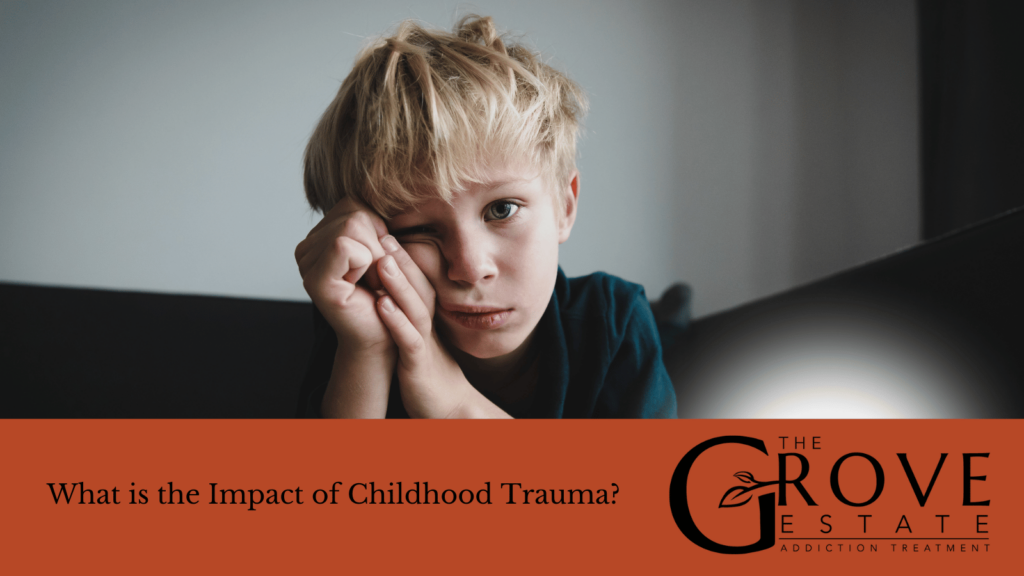Childhood trauma is an alarming issue that has far-reaching consequences on the psychological and emotional well-being of individuals. Defined as a distressing experience occurring during one’s formative years, it encompasses various forms of abuse, neglect, and household dysfunction. Additionally, here is a significant correlation between experiences of trauma in childhood and the development of trauma-induced alcohol abuse later in life.
According to the Substance Abuse and Mental Health Services Administration (SAMHSA), individuals who experienced childhood trauma are at a considerably higher risk of developing alcohol dependence, with studies indicating that over two-thirds of people in alcohol treatment programs report experiencing trauma during their childhood. The alcoholism trauma link demonstrates the need for a comprehensive understanding of the effects of childhood trauma on substance use behaviors, aiming to inform prevention, intervention, and support strategies for those affected.

What is the Impact of Childhood Trauma?
Childhood trauma includes a range of adverse experiences such as physical abuse, emotional neglect, and exposure to domestic violence, which critically affect an individual’s development and mental health. These traumatic events in the formative years are closely linked to a heightened risk of developing substance abuse disorders, including alcoholism, and mental health conditions like depression and anxiety in adulthood.
The mechanisms through which childhood trauma influences behavior include altered stress responses, impaired emotional regulation, and a greater likelihood of engaging in risky behaviors as coping strategies. Individuals with a history of childhood trauma are more susceptible to addiction, partly due to changes in brain chemistry and function related to stress and trauma. The impact extends to social and relational difficulties, with affected individuals often struggling with trust, attachment, and interpersonal relationships.
What is the Connection Between Childhood Trauma and Alcoholism?
Childhood trauma acts as a significant precursor to alcohol abuse in later life, with a complex interplay of psychological and biological factors driving this association. Exposure to traumatic events during childhood, such as abuse or witnessing violence, can lead to maladaptive coping mechanisms, where alcohol becomes a means to numb emotional pain or manage stress.
According to a study published in the “Journal of the American Medical Association,” individuals who have experienced four or more adverse childhood experiences (ACEs) are seven times more likely to suffer from alcoholism compared to those with no ACEs. This emphasizes the gravity of early life stressors in predisposing individuals to alcohol-related problems.
Here is a list of the types of trauma a person experiences at a young age that can lead to alcohol abuse:
- Physical Abuse: Involves bodily harm inflicted on the child, leading to both immediate physical injuries and long-term psychological effects. This type of trauma significantly correlates with the development of alcohol problems in adulthood as individuals may use alcohol to cope with the pain and stress.
- Emotional Abuse: Comprises verbal assaults, threats, constant criticism, or other forms of psychological harm that damage self-esteem and emotional development. Victims often turn to alcohol as a means to escape negative feelings about themselves.
- Sexual Abuse: Entails inappropriate sexual behavior or coercion into sexual activities, profoundly affecting the victim’s psychological and emotional well-being. This trauma is linked with higher rates of alcohol abuse as a coping mechanism for the distressing memories and feelings.
- Neglect: Both physical and emotional neglect involve the deprivation of essential needs and emotional support, leading to developmental deficits and attachment issues. Individuals who experienced neglect may abuse alcohol in adulthood seeking comfort or escape from feelings of abandonment.
- Witnessing Violence or Substance Abuse: Exposing children to traumatic stressors within the family, such as domestic violence or parental substance abuse, normalizes harmful behaviors and creates a dysfunctional environment. This exposure significantly increases the likelihood of alcohol problems later in life.
What are the Symptoms of Trauma-Induced Alcoholism?
Recognizing the symptoms of trauma-induced alcoholism involves understanding the complex interplay between emotional, behavioral, and physical signs in affected individuals.
Emotionally, those suffering may exhibit mood swings, persistent feelings of depression and anxiety, and carry a burden of guilt or shame related to their traumatic experiences. They often turn to alcohol as a means to self-medicate these overwhelming emotions.
Behaviorally, an increased reliance on alcohol to cope with daily stressors becomes apparent, alongside social withdrawal and a noticeable decline in performance at work or school. Risky behaviors, such as drinking and driving or experimenting with other substances, may also emerge.
Physically, individuals might experience changes in sleeping patterns, weight fluctuations, or a neglect of personal hygiene. Dependency on alcohol can lead to withdrawal symptoms when not drinking, signaling a physical reliance on the substance.
The relationship between trauma and alcohol abuse is recurring, with alcohol serving as a temporary relief from trauma-related distress, which only serves to deepen the dependency and exacerbate the original trauma symptoms, creating a challenging cycle that is hard to break without professional help.
What Treatment Approaches are used for Trauma and Alcoholism?
Dual diagnosis treatment for trauma and alcoholism necessitates a holistic approach that integrates specialized care with comprehensive treatment programs. This strategy encompasses both traditional therapies and alternative methods, tailored to address the individual’s physical, emotional, mental, and spiritual well-being. Key components include:
- Integrated Treatment Programs: These offer a coordinated approach to manage substance abuse and mental health issues concurrently, combining psychotherapy, medication, and sobriety support.
- Therapeutic Modalities: Techniques such as Cognitive-Behavioral Therapy (CBT), Dialectical Behavior Therapy (DBT), and Eye Movement Desensitization and Reprocessing (EMDR) are pivotal in addressing the intertwined nature of trauma and alcoholism.
- Wellness and Support: Mindfulness, meditation, nutritional counseling, and physical wellness activities, alongside peer support groups, provide a foundation for recovery by enhancing overall health and creating a community of support.
Understanding trauma-related alcoholism is needed for its ability to offer tailored treatment plans and access to resources specifically designed for those with complex dual diagnoses. It brings together professionals skilled in navigating the intricacies of co-occurring disorders, ensuring that treatment addresses both the trauma and alcoholism in a compassionate and comprehensive manner. This integrated approach significantly improves the likelihood of a successful and sustainable recovery and support for trauma survivors.
How Does Therapy Help in Healing Trauma and Alcoholism?
The childhood trauma recovery journey through therapy encompasses processing trauma in a safe space, learning healthy coping mechanisms as alternatives to alcohol, and rebuilding self-esteem and trust. It addresses co-occurring mental health issues and empowers individuals towards autonomy and recovery. This holistic approach facilitates healing from trauma and overcoming alcoholism, leading to a more fulfilling life.Therapy for childhood trauma is important in treating alcoholism, as it addresses the underlying emotional pain that often leads to substance use. Here’s a list of effective trauma therapies for alcohol abuse:
Effective Therapies:
- Cognitive-Behavioral Therapy (CBT) and Dialectical Behavior Therapy (DBT) help change negative thought patterns and improve emotional regulation.
- Eye Movement Desensitization and Reprocessing (EMDR) processes traumatic memories, reducing the need for alcohol as self-medication.
- Trauma-Focused Therapy and Motivational Interviewing (MI) directly tackle the effects of trauma and motivate change in alcohol use.
- Group Therapy offers community support, sharing coping strategies for trauma and alcoholism.
How Can I Support a Loved One with Trauma-Induced Alcoholism?
Supporting loved ones with trauma-induced alcoholism involves understanding their needs and providing compassionate support. Family and friends can offer a listening ear, encourage professional help, and maintain a non-judgmental stance. It’s important to recognize the complexity of trauma survivors’ experiences, respecting their pace in recovery and ensuring they feel safe and supported. By educating themselves about trauma and addiction, supporters can become invaluable sources of strength, aiding their loved ones on the path to healing and sobriety.
What is the link between childhood trauma and alcoholism?
Childhood trauma and alcoholism are closely linked, as many individuals use alcohol as a coping mechanism to numb emotional pain and stress related to traumatic experiences. This can lead to a cycle of dependency and addiction as the person relies increasingly on alcohol to manage unresolved trauma.
What percentage of alcoholics have childhood trauma?
The exact percentage of alcoholics who have experienced childhood trauma varies by study, but research consistently shows a high correlation. According to the National Institute on Alcohol Abuse and Alcoholism (NIAAA) as many as 60% to 80% of individuals in treatment for alcohol abuse report experiences of childhood trauma. This indicates a significant overlap between childhood trauma and the development of alcohol use disorders later in life.
What is the biggest risk factor for alcoholism?
The biggest risk factors for alcoholism include genetic predisposition, environmental factors, early exposure to alcohol, mental health disorders like depression and anxiety, and significant stress or trauma, especially in childhood. Among these, genetic factors and early life experiences, such as trauma, are particularly influential.
What are the long-term effects of childhood trauma?
Long-term effects of childhood trauma can impact emotional, physical, and mental health. These may include chronic health conditions, such as heart disease and diabetes, mental health disorders, including depression and anxiety, substance abuse, difficulties in relationships, and challenges in coping with stress or conflict.
What are the symptoms of childhood trauma in adulthood?
Symptoms of unresolved childhood trauma in adulthood can include anxiety, depression, PTSD, difficulty forming or maintaining relationships, low self-esteem, substance abuse, and emotional unrest. Individuals may also exhibit avoidance behaviors, including avoiding situations that remind them of the trauma.
Is trauma the root cause of addiction?
Trauma is one of several potential root causes of addiction. While not everyone with addiction has experienced trauma, and not everyone who experiences trauma develops an addiction, there’s a strong correlation between trauma exposure and increased risk of substance use disorders, including alcoholism.
Can holistic therapy effectively address childhood trauma and alcohol abuse?
Holistic therapy is recognized for its effectiveness in treating the interconnected issues of childhood trauma and alcohol abuse. By focusing on the whole person—mind, body, and spirit—holistic therapies offer a comprehensive approach to healing that traditional methods may overlook. According to Healthline, therapies such as mindfulness, yoga, and art therapy can provide therapeutic benefits by helping individuals develop healthier coping mechanisms, improve emotional regulation, and address the psychological wounds of trauma.
The journey after alcohol detox often requires a multifaceted approach to prevent relapse and foster lasting recovery. Holistic therapy can play a crucial role in this phase, supporting individuals in building resilience, self-awareness, and a deeper understanding of the impact of their trauma. Healthline notes that integrating holistic practices into a broader treatment plan can enhance the recovery process, offering tools for managing stress, reducing cravings, and ultimately leading to a more balanced and fulfilled life post-recovery.

Share This Post



